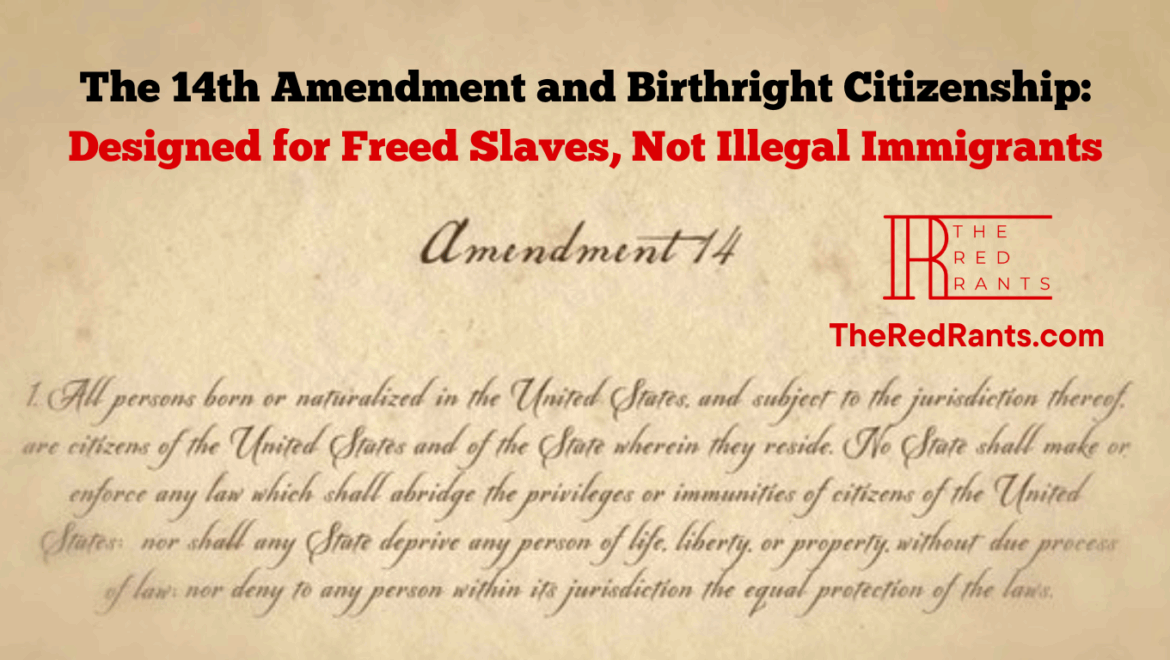The 14th Amendment, ratified in 1868, was a transformative constitutional provision aimed at securing citizenship and rights for freed slaves after the Civil War. Its citizenship clause, granting birthright citizenship to those born on U.S. soil “and subject to the jurisdiction thereof,” was crafted to address the legal vulnerabilities of African Americans. However, modern debates have questioned whether this clause was intended to grant automatic citizenship to children of illegal immigrants. This article explores the amendment’s historical context and original intent, arguing that it was specifically designed for freed slaves and not for those crossing U.S. borders unlawfully.
Historical Context
The 14th Amendment was born during Reconstruction, a period focused on integrating millions of freed African Americans into society as full citizens. The 1857 Dred Scott v. Sandford decision had denied citizenship to African Americans, leaving freed slaves in legal limbo post-emancipation. The amendment’s first section states: “All persons born or naturalized in the United States, and subject to the jurisdiction thereof, are citizens of the United States and of the State wherein they reside.” Constitutional scholars, such as those at the Heritage Foundation, note that this clause was a direct response to Dred Scott, ensuring that freed slaves and their descendants were recognized as citizens.
The Citizenship Clause and Freed Slaves
The citizenship clause was explicitly crafted for freed slaves. During the 1866 congressional debates, as recorded in the Congressional Globe, Senator Jacob Howard emphasized that the clause would grant citizenship to “every person born within the United States,” with a clear focus on freedmen. The principle of jus soli (“right of soil”) guaranteed that children born to former slaves on U.S. soil were citizens, protecting them from Southern states’ Black Codes, which sought to limit African American rights. The clause was a constitutional anchor to secure the freedmen’s status in a nation still grappling with slavery’s legacy.
The Jurisdiction Clause
The phrase “subject to the jurisdiction thereof” is critical to understanding the amendment’s scope. Constitutional originalists, such as those at the Claremont Institute, argue that it limited citizenship to those fully under U.S. legal authority. Senator Lyman Trumbull, in 1866, explained that this meant owing allegiance to the U.S. and being subject to its laws. Freed slaves, as permanent residents post-emancipation, clearly met this criterion. In contrast, illegal immigrants, who enter without authorization and are subject to deportation, do not align with this definition in the same way, as their presence violates U.S. law.
According to the author of the 14th amendment, “And subject to the jurisdiction thereof” means subject to the complete jurisdiction, not a partial jurisdiction, such as that which applies to anyone temporarily sojourning in the United States (whether lawfully or unlawfully).
— The Redheaded libertarian (@TRHLofficial) January 20, 2025
No Intent for Illegal Immigrants
The 14th Amendment’s framers did not contemplate illegal immigration, as the concept was virtually nonexistent in 1868. Immigration laws were minimal, and borders were loosely regulated. The Congressional Globe records no discussion of granting citizenship to children of those entering the U.S. unlawfully. The amendment’s broad language was designed to ensure that freed slaves could not be excluded, not to address future immigration scenarios. Constitutional scholar John Eastman, writing for the Federalist Society, argues that the clause was narrowly tailored to the freedmen’s crisis, not intended as a universal policy for all births on U.S. soil.
The 1898 Supreme Court case United States v. Wong Kim Ark, often cited in modern debates, ruled that a child born to legally resident Chinese immigrants was a citizen. However, this case did not involve illegal immigrants, and its application to such cases is a later extrapolation. Scholars at the Heritage Foundation emphasize that the framers’ silence on illegal immigration reflects its irrelevance to their goals, not an endorsement of automatic citizenship for children of unauthorized entrants.
Modern Misinterpretations
Applying birthright citizenship to children of illegal immigrants has been criticized as a misreading of the 14th Amendment. The framers’ focus was on freed slaves, not on creating a policy that incentivizes illegal border crossings. Senator Edgar Cowan, in 1866, expressed concerns about extending citizenship to children of “foreigners” lacking allegiance to the U.S., suggesting that even then, the framers were cautious about overly broad applications. Constitutional historians, like James Ho of the Claremont Institute, argue that the amendment’s purpose was to protect those already part of the nation’s fabric, not to reward unlawful entry.
Hi Margaret. Constitution thumper here. There is no clause in the 14th amendment that protects criminals from deportation. Also, per its authors John Brigham (OH) & John Howard (MI), the citizenship clause applied to slaves, not anyone finding a loophole.pic.twitter.com/t5pIxw7TzG
— The Redheaded libertarian (@TRHLofficial) January 28, 2025
Complementary Protections
The 14th Amendment’s equal protection and due process clauses complemented the citizenship clause, ensuring that freed slaves could not be stripped of their rights by discriminatory state laws. Representative John Bingham, a key framer, argued for a constitutional shield for African Americans, as documented in the 39th Congress debates. These provisions were tailored to the freedmen’s needs, not to future immigration challenges, reinforcing the amendment’s specific historical focus.
According to the authors of the 14th amendment, the citizenship clause was meant to be retroactive, to right the wrongs of slavery, not a forward motion statute for the world.
— The Redheaded libertarian (@TRHLofficial) April 17, 2025
It needed to go to be reviewed by the Supreme Court. pic.twitter.com/bqDdOfBtMy
Final Thoughts
The 14th Amendment’s birthright citizenship clause was a targeted measure to secure citizenship for freed slaves, ensuring their integration as full members of the United States. Its language, while broad to protect African Americans, was not intended to grant automatic citizenship to children of illegal immigrants. The framers’ focus was on justice for those emancipated, not on addressing modern immigration issues absent from their time. Misinterpretations have expanded the clause’s scope, but its original intent remains rooted in the struggle for freedmen’s rights.
Let us know your thoughts.




Add Comment